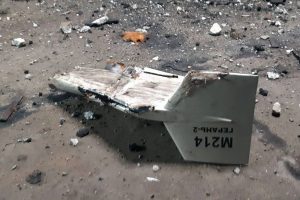As if the Ukrainian government doesn’t have enough to deal with, the Ministry of Foreign Affairs of Uzbekistan appealed this week to Kyiv to “take appropriate measures” to prevent media from spreading “unfounded accusations” that Iranian drones — like those recently terrorizing Ukrainian skies — were assembled in Uzbekistan.
The kerfuffle can be sourced back to a video interview posted to YouTube on October 26 by Ukrainian journalist Dmitry Gordon with Russian-born Israeli businessman Leonid Nevzlin. In the interview, Nevzlin discussed Iranian military drones, stating that Israel had prevented Iran from supplying Russia by attacking a factory in Syria. He then went on to say that drones were also produced in Iran and Iraq. At that point Gordon cut in, asking about the possibility of Israeli strikes on factories in other countries, including Uzbekistan in that list. Nevzlin replied: “I can’t say anything about Uzbekistan. Because Uzbekistan is a neutral and friendly country. I don’t know if Israel knows that drones are being assembled there, I hope they do. An ultimatum from Israel and America will be enough for them. And they will stop.”
The Uzbek State Committee for the Defense Industry immediately fired back, categorically denying that Uzbekistan did or does assemble Iranian drones. In a press release, the State Committee of the Defense Industry stated, “it should be noted that Uzbekistan has never cooperated with Iran and declares that it did not produce military equipment and is not producing it today.” The committee aired concerns that such reports could damage “friendly relations” with foreign countries.
The Uzbek Ministry of Foreign Affairs followed up with its own statement denying the suggestion that Iranian drones were, or are, being assembled in Uzbekistan.
“We declare that the Republic of Uzbekistan does not cooperate with the Islamic Republic of Iran in the military-technical sphere and does not assemble Iranian military equipment on its territory,” the ministry said, followed by an urging of the Ukrainian authorities to “take appropriate measures to prevent the Ukrainian media from spreading such unfounded accusations and other unreliable information about Uzbekistan that could damage bilateral relations.”
It’s possible Gordon misspoke, for while Uzbekistan has not been reported to have any kind of production arrangement with Iran regarding military drones (Tashkent is more keen on producing its own), neighboring Tajikistan does have such an arrangement in place. Indeed, drones are all the rage in military acquisitions in Central Asia these days, with Kazakhstan and Kyrgyzstan working with Turkish companies to domestically produce Turkish drones and Iran also shopping around for partners.
In May, Iran’s Major General Mohammad Bagheri, the chief of staff of the Iranian Armed Forces, traveled to Dushanbe to meet with President Emomali Rahmon and senior military officials. Together, they inaugurated an Ababil-2 drone factory. The Ababil-2 is a relatively cheap, older model of tactical drone with a range of 200 kilometers. It can spend about 1.5 hours in the air.
Importantly, the type of drones witnessed attacking Iran appear to be Shahed-136s, a much more modern type of drone than the ones the new factory in Tajikistan is reported to be producing. The Shahed-136 is a more recent development, with an estimated range of 1,800 to 2,500 kilometers. Iran has denied supplying the drones to Russia, but a flood of video footage of the drones over Ukraine suggests otherwise.
Even if Gordon merely misspoke, confusing one Central Asian state with another, the core accusation still remains unfounded: The specific type of Iranian drone witnessed attacking Ukraine are not being assembled in Central Asia, not according to any available government or media reports.
Tashkent’s quick and strident denial underscores the importance of maintaining neutrality in the conflict for Uzbekistan. Although Uzbekistan and Russia declared a comprehensive strategic partnership last month and Russian President Vladimir Putin awarded Uzbek President Shavkat Mirziyoyev with the Order of Alexander Nevsky for “strengthening friendship and cooperation between the two countries,” Tashkent has worked to remain as neutral as possible given its geopolitical circumstances when it comes to the conflict in Ukraine. It’s not a comfortable position to occupy.

































